Fielding Yost became Michigan's head coach in 1901 at age 30.
- The standout tackle at the University of West Virginia had hopscotched across the country during his coaching career:
--Ohio Wesleyan (1897)
--Nebraska (1898)
--Kansas (1899)
--Stanford (1900)
--San Jose State (1900 - one game only) - He never came close to a losing season, his worst mark being 7-2-1 at Stanford. His best year was at Kansas when his Jayhawks won all ten games. He also won his team's league championship every year.
- He did all this as a part-time coach. He built a highly successful business career, chiefly in oil and minerals, during the 2/3 of each year not devoted to football.
- Michigan lured Yost with a salary of $2,300, more than twice what Stanford paid him. Also, the university would pick up the tab for all his living and eating expenses in Ann Arbor from September 1 to the end of the football season.

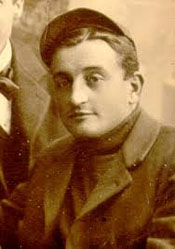
L: Fielding Yost, R: Gustave Ferbert
Yost did not inherit a downtrodden program.
- The Wolverines' cumulative record the previous five years, which coincided with UM's membership in the new Western Conference, was 33-4-1.
- Included was a 10-0 conference championship team in '98 coached by Gustave Ferbert.
Yost enjoyed success from the beginning in Ann Arbor.
- His first Maize and Blue squad finished 10-0 to tie for 1st in the conference with Wisconsin, whom they did not play.
- The Wolverines outscored the opposition 270-0, including a 128-0 humiliation of Buffalo.
A football rule carried over from rugby greatly aided Michigan's domination. The team that was scored on had to kickoff to the scoring team. So many Wolverine TDs against Buffalo were scored on kickoff returns as the Bisons became more and more fatigued and discouraged.
But the season didn't end in November because Yost had been planning a trip west for his club during the Christmas break.
- Officials of the Rose Parade in Pasadena CA wanted to stage a football game after their parade on January 1, 1902. Michigan would meet Stanford - Yost's team from the year before.
- The game proved to be no contest. Stanford might have been the champions of the Pacific Coast Conference, but they were no match for the Wolverines and their "hurry-up" offense.
- The score was 49-0 when the Stanford captain approached his Michigan counterpart and said, "If you are willing, sir, we are ready to quit."
- So Yost's first Michigan team ended the season with a 319-0 point differential to earn the monicker "Point-a-Minute team."
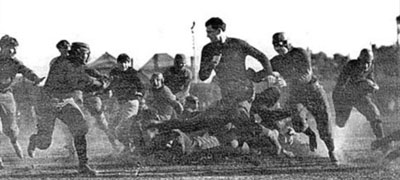
1902 Rose Bowl action
- After Albion fell 88-0, Case ended Michigan's shutout string, scoring the first TD allowed by a Yost-coached Wolverine team. Final score: 48-6. The next victim was Michigan Agricultural (today's Michigan State) 119-0.
- Conference foe Indiana fell 60-0, then Notre Dame 23-0, and Ohio State 86-0.
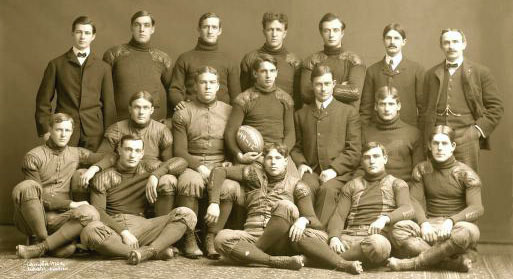
1902 Michigan Wolverines
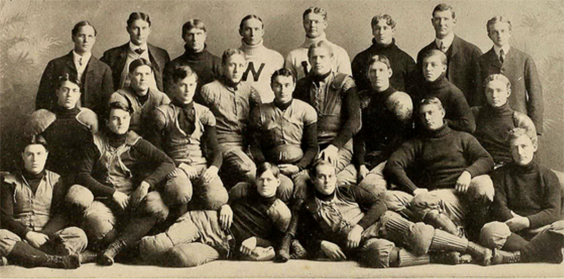
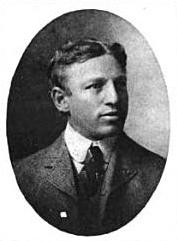
1902 Wisconsin Badgers and Coach Phil King
Could anyone derail the Michigan express? The next opponent, Wisconsin, believed they could.
- Philip King had built a strong program in Madison starting in 1896. Through the 1901 season, the Badgers were 41-6-1 under King. However, they had played Michigan only once, defeating the Wolverines 17-5 in 1899.
- The 1901 Badgers went 9-0, outscored its opponents 317-5, and tied with Michigan for the conference title since the two teams did not meet.
- Neither school was satisfied with that outcome. So a game was scheduled for November 1, 1902.
- King scouted the Michigan-Indiana game along with his FB Earl Driver. King was justifiably concerned. "Michigan is playing a very fast game, and the team is much further advanced in the game at this time than is Wisconsin. We realize, and have realized, that we have a very hard proposition to meet on November 1."
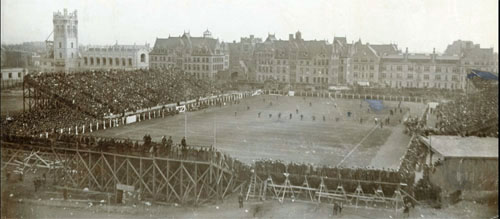
Marshall Field during a 1900 game
- Home to numerous graduates of both Wisconsin and Michigan, Chicago was fertile recruiting territory for both schools.
Michigan had numerous alumni "scouts" in the Windy City who helped recruit players for their alma mater, thus adding to the animus between Stagg and Yost.
- So while the game was ostensibly moved to Chicago to accommodate a larger crowd, it also gave Stagg's two biggest rivals a chance to show their programs to high school football players in the Windy City.
- Circus bleachers were moved into position at Marshall Field to accommodate additional fans.
Wisconsin knew they would have to be at their best to beat the Wolverines.
- The Badgers dispatched Kansas 38-0 to move to 5-0 heading into the big clash in Chicago. But a Kansas player who had played for Yost when he coached the 1899 team told a reporter, "Wisconsin plays a good game, but she'll have to play faster than that to beat Michigan."
- One writer opined that the Badger defense was "the best that has been shown by a Wisconsin eleven in years. The general opinion is that the line is absolutely impregnable, and that Michigan will be unable to break it down or to get around the ends."
- Also, "King has been quietly adopting some of the styles of play in which Michigan excels, one being the tackle back play ... The coach has also perfected a number of trick plays, which will be tried for the first time in the big contest. If Wisconsin ... can get within striking distance of Michigan's goal, Captain Juneau will try drop kicks from the field."
However, word of UM's 86-0 slaughter of Ohio State (just "Ohio" in those days) sent a wave of gloom through the Wisconsin camp. King would have to work hard to instill confidence in his men.
- Monday's work consisted of a four-mile walk. The "stiff work" was scheduled for Tuesday and Wednesday, with a scrimmage against the "scrubs" on the latter day. "None of the trick plays which it is reported will be used against the Michigan team was tried on the scrubs in the open practice."
- Two Wisconsin stalwarts suffered from leg injuries: FB Driver and Captain W. J. Juneau. The latter was injured in Wednesday's scrimmage and used a cane the next day. Driver was held out of scrimmages to let his knee heal but did practice kicking.
- The Thursday practice "consistently principally of signal and formation work ... and running down punts." The practice was witnessed by an estimated 1500 people, "a larger crowd ... than has attended any of the home games this year. The students marched from the gymnasium to the field, headed by the university band, and watched the play of the team with great interest, cheering the men at every good play made."
- In accordance with a school tradition, "the players after the practice returned from Camp Randall [Stadium] to the gym in a single file ... chanting peans of victory."
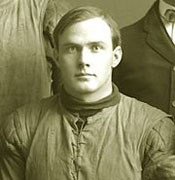
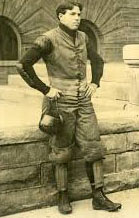
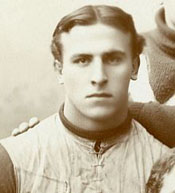
L-R: Joe Maddock, Willie Heston, "Pa" Henninger
- Yost was reported to be concerned that his team was "too confident." He told his players that they had not met as good a team as Wisconsin the last two years. When asked how his team's final practice went, he replied, "Well, it wasn't quite so good as last week's." When asked about the upcoming game, Fielding said, "I do not know how we will come out. I have never seen the other fellows play. From what I have read, I judge that it is going to be a hard contest, and each team will realize that it has been in a football game." A reporter asked him, "Is Michigan up to the 1901 standard?" "I should say not. Last year's team got down and 'scratched gravel' all the time."
Yost had recruited several Michigan players from past years to help at practices, including "Pa" Henniger, a G-T from '93-'96, and Jack McLean, a '97-'98 HB. McLean had been the head coach at Knox College, one of the two teams that scored on Wisconsin during the 1901 season.
- Lineman Joe Maddock was expected miss the game "on account of a boil on his hand" and a sprained wrist. Star HB Willie Heston nearly bit his tongue in half during the Ohio game. As a result, he couldn't eat but "must hold back his head and be fed gruel beef broth and milk." However, he was expected to play Saturday.
- "Every student of the university turned out to a big singing meeting held in University hall" Thursday night. "Songs, red-hot speeches, thundering yells and, in short, every form of expression of Michigan enthusiasm was the order, and combined to make the meeting one of the most enthusiastic demonstrations of spirit seen at Michigan in some time. Professor Trueblood was on hand to lead the locomotive yell which has met with such popularity. This yell is designed to drown out the Wisconsin yell."
- 17 players, the coach, and the trainer departed Friday morning while the "larger part" of the student body, with the band, took a Michigan Central train Saturday morning.
- The betting line ended at 7 to 6 in favor of the Wolverines. A Michigan alumnus in Chicago who bet $250 even that his alma mater would win declined offers from two Wisconsin men to double the wager, which he declined to do.
- Those betting on Wisconsin pointed out that, while Michigan had rolled up phenomenal scores the last two years, neither her offense nor her defense had been severely tested. Most of the Wolverine scores came on long end runs by Heston and Herrstein. But the Badger ends, Abbott and Juneau, were strong enough to stop those plays.
- Coach King promised his squad was ready. "The men are all in good condition and will fight the game of their lives tomorrow." Yost sounded less confident. "The man who thinks Michigan has a cinch does not k now what he is talking about. If we are defeated, it will be mainly due to overconfidence, a spirit that is so manifest I cannot break it up."
A report the day before the game said, "Rooters from Ann Arbor and Madison are in Chicago in force, thronging the hotel lobbies and parading the streets bedecked with ribbons and taunting banners. There is more enthusiasm among rooters than seen in years. ... Even a portion of the Ann Arbor police took a holiday and came with the boys. Tonight the Michigan team and crowd will attend "The Sleeping Beauty and the Beast" at the Illinois theater. The receipts will aggregate $30,000. After paying for the field and other necessaries, the balance will be divided equally between Michigan and Wisconsin."
The Wisconsin University Alumni Association was formed Friday evening at a banquet at the Victoria Hotel in Chicago. The football team attended, and Phil King gave a talk on "'What I Don't Know about Football."
Another article included this information: "A large supply of megaphones are to be on sale when the Saturday morning train arrives at Chicago, and it is expected that every rooter will fortify himself with one of these instruments."
When trains carrying 1,500 Wisconsin students arrived shortly before noon Saturday, the band led a parade along downtown streets in the Windy City. "Every man carried a cane with a red burgee, on which was a white 'W,' and on the lapel of each coat was a huge chrysanthemum. The students created quite a stir with their songs and college yells as they marched along. Crowds lined the sidewalks and gave the boys cheer for cheer."
Meanwhile, the Michigan Alumni Association distributed over 7,000 copies of their football songs to the Maize and Blue supporters. This helped make the singing during the game "the best ever heard on Marshall Field," to quote a Chicago reporter.
| WISCONSIN | Position | MICHIGAN | ||||||
| Allen Abbott | 21 | 174 | 6-1 | LE | Curtis Redden | 21 | 180 | 5-11 |
| F. A. Long | 22 | 192 | 5-10 | LT | William Palmer | 24 | 186 | 5-8 |
| Wilson Bertke | 24 | 180 | 5-11 | LG | Dan McGugin | 22 | 182 | 5-11 |
| Emil Skow | 24 | 197 | 5-9 | C | George Gregory | 22 | 188 | 5-11 |
| Arnie Lerum | 24 | 199 | 5-10 | RG | Charles Carter | 22 | 231 | 6-0 |
| E. J. Haumerson | 21 | 176 | 5-11 | RT | Joe Maddock | 24 | 187 | 5-11 |
| James Bush | 19 | 162 | 5-10 | RE | Everett Sweeley | 21 | 170 | 5-10 |
| Joe Fogg | 20 | 148 | 5-9 | QB | Harrison Weeks (C) | 22 | 158 | 5-7 |
| Liljequist | 21 | 167 | 5-8 | LH | Willie Heston | 23 | 174 | 5-8 |
| W. J. Juneau (C) | 21 | 162 | 5-10 | RH | Albert Herrnstein | 20 | 168 | 5-10 |
| E. J. Vanderboom | 21 | 168 | 5-11 | FB | Paul Jones | 22 | 170 | |
A crowd estimated at 22,000, the largest at a college football game in the west, overflowed Marshall Field on an unseasonably warm, overcast day.
- Attendance could have been higher, but the gates were closed when Chicago football "manager" Barleme cut off ticket sales after an unfortunate incident during the first half injured a number of people, as will be explained in due time. One man who was turned away offered $20 to a fan with a ticket but was spurned.
- Many of those turned away watched from the roofs of nearby buildings. "By the time the second half began, there was not an unoccupied roof, telegraph pole, lamp post or window within eyesight of the gridiron."
Hundreds of football enthusiasts in Kalamazoo MI gathered around the bulletin board of the Gazette-News to follow the game via reports from Chicago.
Even in neutral-state Minneapolis, a large crowd gathered to follow the game via "special wire service direct from Marshall Field" to the offices of The Minneapolis Journal.
Pregame
- When the gates opened at noon, a large number of fans poured through, the 2,000 Wisconsin rooters filling the west stands with a like number of Michigan "cranks" on the opposide side.
- The Michigan band marched down the field at 1:50 only to be drowned out by a "vocal storm through megaphones" from the Badgers in the west stands.
- The Wisconsin team took the field at 2:11, followed a few minutes later by the Wolverines "amid vociferous cheers."
- "The Madison boys on arrival practiced punting and carrying the ball, the Michiganders, meanwhile speeding through some of Yost's fast formations."
The game, which began at 2:40 after Chicago defeated Beloit 18-0 on the same field that morning, consisted of two 35-minute halves.
First half
- One of Yost's oft-quoted axioms was, "Hurry up and score in the first few minutes of a game before your opponents realize what is going on." To that end, he ran what today would be called a "no huddle offense." All eleven starters, every one in excellent physical condition, followed the ball downfield each play and started lining up for the next snap even before the pile was untangled. QB Harrison "Boss" Weeks often called the signals for the next play while the defense was hustling into position. Sometimes the Wolverines would run four or five plays without a signal - similar to today's "scripted" drives. The team was so well prepared that, as Heston recalled, "everyone knew what to do and what play was coming up. Our opponents didn't have much of a chance to get set for us."
- The most popular offensive set in 1902 was the "tackles-back" formation. With only five players required on the line of scrimmage, the two tackles lined up in the backfield. (Some teams used the "guards-back" formation instead of or in addition to the tackles-back.) From that starting point, one tackle could lead the runner while the other lagged behind him and pushed him forward or even grabbed the leather straps (handles) sewn into the shoulders of the jersey or on the hips of their trousers and dragged or even threw the ball carrier forward. Sometimes the tackles carried the ball.
- As is still true today, only one backfield player could be in motion at the snap and he could not be moving forward at the snap.
- However, teams had three downs to gain five yards. (Hence the striping of the field every five yards as is still the case today.)
- Forward passes were illegal until 1906.
- Three officials worked each game: "A referee for position and progress of he ball and umpire for the conduct of the players" and, since 1894, a linesman. Louis Hinkey of Yale served as referee with umpire Everett Wrenn of Harvard. (The linesman's name was not listed.)
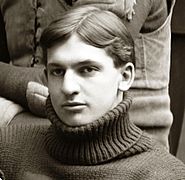
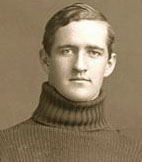
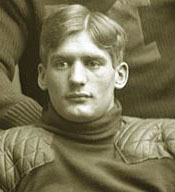
L-R: Harrison Weeks, Paul Jones, Albert Hernnstein
The Wolverines took the opening kickoff and moved right down the field.
- King expected Michigan to use the strategy that had worked well all year - mostly end runs mixed with occasional up-the-middle plunges. But Yost, sensing what King was thinking and convinced his line was stronger than the Badger forwards, had QB Weeks run play after play up the gut. To facilitate that strategy, Yost started Paul Jones at FB instead the speedier but smaller James Lawrence.
- Starting from their 35 after Curtis Redden returned the kickoff 10y, Wisconsin held for two plays, but Michigan gained a first down on a fake kick. Again the Badgers forced third down only to have Albert Hernnstein push through the center for 3y to allow UM to retain possession. In a display of "the fastest kind of ball," a 5y gain around RE was followed by eight more around LE. Hernnstein skirted LE for 15y to the 20. When the Wolverines reached the 3, T Joe Maddock, starting despite his boil, rammed over the goal line. Everett Sweeley "kicked goal" to make it 6-0 Michigan after eight minutes of play.
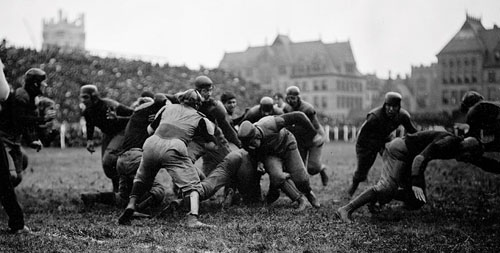
Michigan-Wisconsin action 1902 - At least the exhausted Badgers would get the ball - right? No. The rules required the team that was scored on to kickoff to the scoring team.
John Kryk: "Teams did not complain about the rule. As in rugby, the thinking was that position on the field was far more important than possession of the ball. And position was more certain than possession in those days because the larger, more roundish ball of the day was harder to handle and nestle, and because the penalty for some infractions, such as holding and forward-passing, actually was a turnover - another rugby staple."
- The kick reached the UM goal line. So the Wolverines started their second possession at their 20. After Hester ran around LE for 5, Weeks followed the custom of the day by punting the ball to midfield.
- After gaining 2y, then losing one, Wisconsin went for it on third down and made it. But no such luck for the Badgers on the next series. So they punted to the 10, the pigskin being returned to the 25. An injured Michigan man was replaced - the only way a substitute could take the field following the tradition of rugby and soccer.
- UM began another drive deep into UW territory. Jones, "a human battering ram in the hands of his teammates," pushed up the middle twice before "another man is laid out." (Was it a Badger trying to slow down the hurry-up offense?) From the UW 35, Hernnstein raced around LE for 15y, suffering a cut over his eye for his trouble. Jones and Maddock smashed the middle, making just enough to retain possession.
About this time, a commotion broke out on the northeast corner of the field. A temporary bleacher built to hold 400 people but filled with 500 collapsed, causing the game to be stopped for a few minutes. Several hundred people were thrown to the ground. "A score of men" were injured, many with broken limbs, but no one was killed. With the police occupied with the accident, the immense crowd broke down the wire fence and swarmed onto the field. But the "scrubs" of each team came to the rescue, shoving the crowd away from the sidelines so the game could resume after a 15-minute delay.
- When play resumed, Michigan continued its march deep into UW territory again. Jones +3, Palmer +4, and Jones +3 before Heston again skirted Bush's end to the 10. But the drive abruptly ended with a fumble.
- Juneau broke free for Wisconsin's first long gain of the day - 30y. But Michigan held and Redden returned 15y to the center of the field. UM then lost the ball because of a holding penalty but got it back two plays later on a punt, Sweeley taking the ball out of bounds at the 25. The Wolverines resumed their smashing runs and quickly moved to midfield. Three runs by Hernnstein and Heston gained 12 through tackle. Then Jones gained 3 at RT, and Palmer and Maddock added 15 more. Jones was "laid out for several minutes" at this point but stayed in the game. Heston ran into LE Allen Abbott "like an avalanche" to put the ball on the 5. UW partisans held their breath since another UM TD would put the game out of reach. Heston moved the pigskin to the 1, but the beleaguered Badgers dug in and stopped Jones to take over on downs. "A mass play was hurled against Long and Abbott. When the scrimmage was over, breathless Wisconsin 'rooters' of second life sent up a mighty cheer. Their line at last had held."
- UW immediately "punted out," but Michigan fumbled the kick, a Badger recovering. It was time for the Red and White to do some smashing of its own. Liljequist gained before Vanderboom did the same. Then Juneau ran around Sweeley's end to midfield, where he fumbled. But Abbott pounced on it at the UW 45. Neither team threatened the rest of the way.
The half ended with Wisconsin in possession on its 10. MICHIGAN 6 WISCONSIN 0
Michigan outgained the Badgers in the first half 273-75.
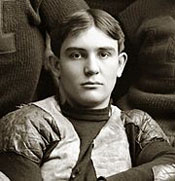
.jpg)
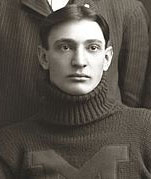
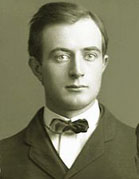
L-R: Everett Sweeley, James Lawrence, Curtis Redden, Dan McGugin
Second Half
- The officials and coaches spent most of the 15-minute break arguing over which team should have the north goal. Verdict: Wisconsin would defend it.
- Michigan's Lawrence, in for Jones at FB, kicked off to Juneau, who returned the ball to midfield. UW gained a quick first down on Abbott's 5y scamper and Juneau's 4y run around Sweeley. But Vanderboom fumbled after gaining 5 to turn the ball over to Michigan. The Badgers, who moved their HBs inside their ends for the second half, gave ground grudgingly, several times forcing Yost's men to take the full three downs to gain the five to keep possession. Then Abbott threw Hernnstein for a 2y loss. When Heston gained only 1, Lawrence tried a place kick from the 45 that didn't come close. Earl Driver "took the free kick from the 20y line and kicked to Redden on Michigan's 50y line, and he carried it back ten yards." The teams exchanged possession of the ball within 10y of the midfield stripe on either side until Driver punted to Hernnstein on the UM 20 where he was "thrown in his tracks."
- After three more punts, Weeks tried "a quarterback kick" that was blocked by Long. But Wisconsin could go nowhere and punted. Michigan seemed content to run out the clock - to use a phrase not in vogue at the time. Hernnstein tried a fake kick but gained only a yard. UW made one first down after receiving a punt but had to kick back three plays later. Michigan moved close enough for Lawrence to miss another place kick from the 25.
Driver kicked right back to Graver, who returned 23y to the 27 "by a brilliant run." But two plunges gained only 1. So Lawrence tried and failed again, this time from a bad angle at the 25. Michigan got the ball right back, recovering Juneau's fumble at the 30. But all that gained the Maize and Blue was another missed FG by Lawrence. But Wisconsin didn't want the hot potato and kicked to the center of the field to Weeks, who was thrown after failing on a fair catch. After gaining 15y, Michigan tried another "free kick for goal" from the 35. Lawrence went 0-for-5.
Minutes later "the game was called" with the ball in Michigan's possession "on its own fifty-yard line." FINAL SCORE: MICHIGAN 6 WISCONSIN 0Michigan outgained the Badgers 92-48 for a total advantage of 365-123.
Postgame
- Weeks: "I am almost too happy to talk. It was an awful hard game. We should have had two more touchdownsin the first half. My poor judgment kept us from scoring oftener. Our defense certainly impressed Wisconsin. They caught us napping several times and drew our ends in, but on the whole our defense was good. We are all tickled to death at the result."
- Coach King: "I think that the better team won. Our boys played a good game, and I am proud of them. It is not a disgrace to be beaten by such a team as Michigan has. The men are all in good conditions. Taking it all in all, it was indeed a great game."
- Captain Juneau of Wisconsin: "Oh, but it was a glorious game. I am indeed very happy. The score should have been 18 to 0. They expected us to play our halfbacks outside of tackle. We surprised them a few, didn't we? I told the team to pound away as long as they could and to pound hard. They pounded hard enough to satisfy even Wisconsin, I think. We surprised them on the defensive. However, their defense, too, was a little stronger than I expected."
- The Chicago Tribune writer summarized the game like this: "Michigan showed the most powerful and concerted attack ever seen in western football. Few of the immense crowd knew that they were witnessing the acme of modern attack. But the football critics and galaxy of western coaches, drawn from far and wide to see the battle of gridiron giants, marveled at the perfection of unified effort which Yost had taught, and his pupils so ably carried out. It was better offense than the Michigan team of 1901, which registered 550 points without being scored on, showed in its best games last year. This is a bold statement but it was the unanimous opinion of those whose business it is to study football for practical uses."
- Former Penn coach George Woodruff, the inventor of the guards-back plays and other innovations, wrote an analysis column for the Tribune: "For two years I have been curious to see the Michigan team play. I was filled with doubts as to whether it was really as strong in material and in style of play as scores would seem to indicate. My curiosity was gratified yesterday at Marshall field ...
That the team is great goes without saying. That it is phenomenal against second class elevens is equally apparent from the scores of the last two seasons. And yet I hesitate to admit that the Wolverines could beat many first class teams which I have seen. As examples I would note the Pennsylvania eleven of 1897, the Yale team of 1900, and the Harvard team of 1901. My hesitancy about the relative merits of Yost's men and teams named above is an evidence that I consider Michigan of both 1901 and 1902 in the front rank of all football teams. ... I believe western teams rank with those in the east. The best here are evenly matched with the best there."
Follow-up
- Seven days after the big game in Chicago, Michigan hosted Iowa in Ann Arbor and embarrassed the Hawkeyes 107-0. Yost didn't bother to attend the game, opting instead to watch Minnesota defeat Illinois 17-5 in Minneapolis.
- Next came another visit to Marshall Field, this time to face Stagg's Chicago Maroons, who were not only 10-0 but had yet to surrender a point. In a clash of coaches who didn't like each other one little bit, Michigan won 21-0.
- Oberline fell easily in a non-conference home game, 63-0.
- That set up another "greatest game ever seen in the West," a showdown with 8-1 Minnesota for the Western Conference championship. Golden Gophers coach Henry Williams, like Stagg, publicly complained about Michigan using ineligible players in another case of "let him who is without sin cast the first stone." Williams claimed that Dan McGugin had already used up his four years of college eligibility. The Gophers managed to push across the second TD the Wolverines surrendered all season, but Yost's men got 23 to complete an 11-0 season as undisputed Western Conference champions.
There was no West Coast trip for the Wolverines over the Christmas break this time. After Michigan routed the Pride of the West, Stanford, in the first Tournament of Roses game after the '02 season, the Pasadena organization decided to postpone any further games until western teams could compete with top teams from the East and Midwest. It would not be until 1916 that another Rose Bowl game would be staged. Michigan would not return to Pasadena until January 1, 1948, 16 months after Yost's death at age 65.
References: College Football U.S.A. 1969 ... 1972: The Official Book of the National Football Foundation,
John McCallum and Charles H. Pearson (1972)
Stagg vs. Yost: The Birth of Cutthroat Football, John Kryk (2015)
1921: Centre @ Harvard
1924: Michigan @ Illinois
1929: Rose Bowl
1939: Texas Tech @ Centenary
1940: Bears @ Redskins
1941: Sugar Bowl
1941: Willamette @ Hawaii
1964: Alabama @ Georgia Tech
1947: Eagles @ Cardinals
1953: Iowa @ Notre Dame
1959: Oklahoma @ Northwestern
1966: Notre Dame @ Michigan State
1967: Ice Bowl (Dallas @ Green Bay)
1971: Nebraska @ Oklahoma
Memorable Games Archives - III
1967: Unlikely Hero (Super Bowl I)
1968: "Harvard Beats Yale 29-29"
1969: Believe in Bo
(Ohio State @ Michigan)
1974: "Who Won the Damn Game?" (Ohio State @ Michigan State)
1979: "You Shoulda Passed" (Sugar Bowl)
1980: Revenge Is Sweet (Kentucky @ Tulane)
1985: Greatest Finish No One Knows About (Principia @ Illlinois College)
1982: Kellen Gives His All (Chargers @ Dolphins)
1982: The Dolphins Wuz Robbed (Dolphins @ Patriots)
1984: No Tie for Tom (Orange Bowl)
1985: Let Sleeping Beavers Lie (Oregon State @ Washington)
1993: "Game of the Century" a Week Later (Boston College @ Notre Dame)
1997: Why It's Called "Foot"-ball (Nebraska @ Missouri
1948: The Snow Bowl (Cardinals @ Eagles)
1958: The Game That Made the NFL (Colts @ Giants)
1962: NFL Championship Game
1984: "We Don't Want No Stinkin' FG"
(Florida-Miami)
1929: Ernie's Record-Setting Day (Cardinals @ Bears)
1934: Gopher Deception (Minnesota @ Pitt)
1939: Why Didn't You Kick? (UCLA-USC)
1942: We Will Have Our Rose Bowl Trip!
1943: Sid Luckman Day (Bears @ Giants)
1952: Evy Surprises Woody (Ohio State @ Iowa)
1956: Unlikely Hero (Rose Bowl)
1963: Birth of Instant Replay (Army-Navy)
1965: A Day to Remember (49ers @ Bears)
Memorable Games Archives - VII
1942: East-West Shrine Game
1943: Del Monte Pre-Flight @ Pacific
1949: Notre Dame @ SMU
1950: The Snow Bowl (Michigan @ Ohio State)
1965: Chiefs @ Oilers
1969: Texas @ Arkansas
1970: Oregon @ UCLA
1972: Auburn vs Alabama
1984: Holiday Bowl
1986: Auburn @ Florida